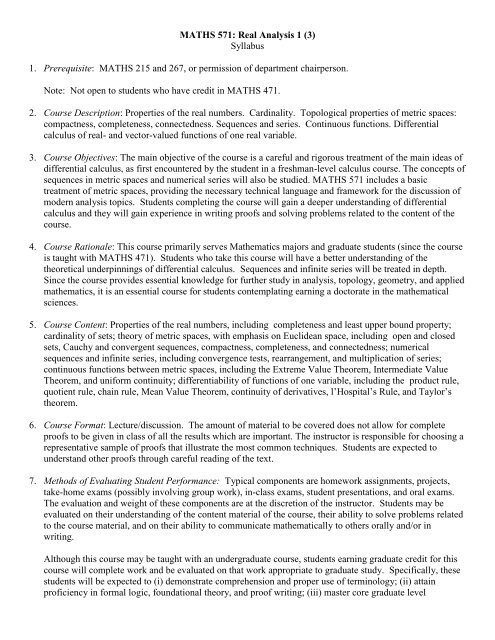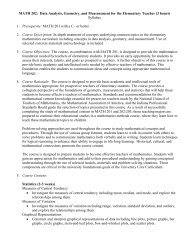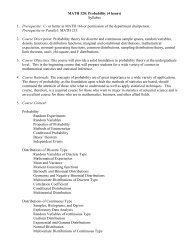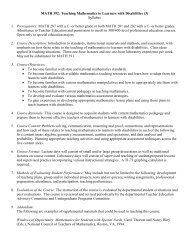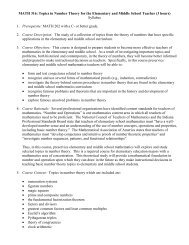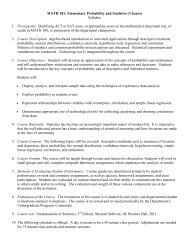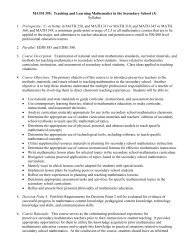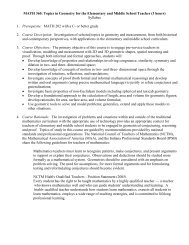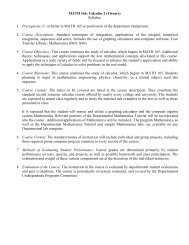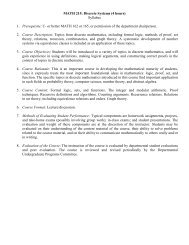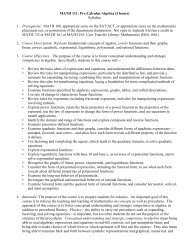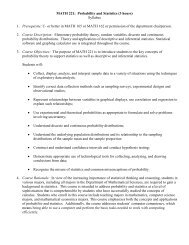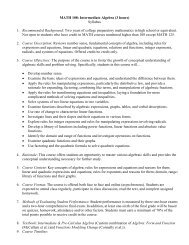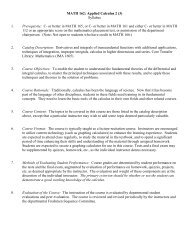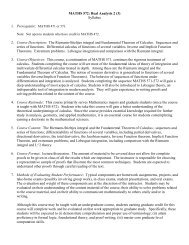MATHS 471: Real Analysis 1 (3)
MATHS 471: Real Analysis 1 (3)
MATHS 471: Real Analysis 1 (3)
You also want an ePaper? Increase the reach of your titles
YUMPU automatically turns print PDFs into web optimized ePapers that Google loves.
<strong>MATHS</strong> 571: <strong>Real</strong> <strong>Analysis</strong> 1 (3)<br />
Syllabus<br />
1. Prerequisite: <strong>MATHS</strong> 215 and 267, or permission of department chairperson.<br />
Note: Not open to students who have credit in <strong>MATHS</strong> <strong>471</strong>.<br />
2. Course Description: Properties of the real numbers. Cardinality. Topological properties of metric spaces:<br />
compactness, completeness, connectedness. Sequences and series. Continuous functions. Differential<br />
calculus of real- and vector-valued functions of one real variable.<br />
3. Course Objectives: The main objective of the course is a careful and rigorous treatment of the main ideas of<br />
differential calculus, as first encountered by the student in a freshman-level calculus course. The concepts of<br />
sequences in metric spaces and numerical series will also be studied. <strong>MATHS</strong> 571 includes a basic<br />
treatment of metric spaces, providing the necessary technical language and framework for the discussion of<br />
modern analysis topics. Students completing the course will gain a deeper understanding of differential<br />
calculus and they will gain experience in writing proofs and solving problems related to the content of the<br />
course.<br />
4. Course Rationale: This course primarily serves Mathematics majors and graduate students (since the course<br />
is taught with <strong>MATHS</strong> <strong>471</strong>). Students who take this course will have a better understanding of the<br />
theoretical underpinnings of differential calculus. Sequences and infinite series will be treated in depth.<br />
Since the course provides essential knowledge for further study in analysis, topology, geometry, and applied<br />
mathematics, it is an essential course for students contemplating earning a doctorate in the mathematical<br />
sciences.<br />
5. Course Content: Properties of the real numbers, including completeness and least upper bound property;<br />
cardinality of sets; theory of metric spaces, with emphasis on Euclidean space, including open and closed<br />
sets, Cauchy and convergent sequences, compactness, completeness, and connectedness; numerical<br />
sequences and infinite series, including convergence tests, rearrangement, and multiplication of series;<br />
continuous functions between metric spaces, including the Extreme Value Theorem, Intermediate Value<br />
Theorem, and uniform continuity; differentiability of functions of one variable, including the product rule,<br />
quotient rule, chain rule, Mean Value Theorem, continuity of derivatives, l’Hospital’s Rule, and Taylor’s<br />
theorem.<br />
6. Course Format: Lecture/discussion. The amount of material to be covered does not allow for complete<br />
proofs to be given in class of all the results which are important. The instructor is responsible for choosing a<br />
representative sample of proofs that illustrate the most common techniques. Students are expected to<br />
understand other proofs through careful reading of the text.<br />
7. Methods of Evaluating Student Performance: Typical components are homework assignments, projects,<br />
take-home exams (possibly involving group work), in-class exams, student presentations, and oral exams.<br />
The evaluation and weight of these components are at the discretion of the instructor. Students may be<br />
evaluated on their understanding of the content material of the course, their ability to solve problems related<br />
to the course material, and on their ability to communicate mathematically to others orally and/or in<br />
writing.<br />
Although this course may be taught with an undergraduate course, students earning graduate credit for this<br />
course will complete work and be evaluated on that work appropriate to graduate study. Specifically, these<br />
students will be expected to (i) demonstrate comprehension and proper use of terminology; (ii) attain<br />
proficiency in formal logic, foundational theory, and proof writing; (iii) master core graduate level
computation skills.<br />
8. Evaluation of the Course: The instruction of the course is evaluated by departmental student evaluations and<br />
peer evaluation. The course is reviewed and revised periodically by the Departmental Graduate Programs<br />
Committee.<br />
9. Addendum: Suitable textbooks for this course include the following.<br />
Rudin, W., Principles of Mathematical <strong>Analysis</strong> (3 rd Edition)<br />
R. Stankewitz, 10/10/09 (Adapted from Maths <strong>471</strong> syllabus of Ahmed Mohammed, Michael Karls, Spring<br />
2007); R. Stankewitz, 2/15/12;


